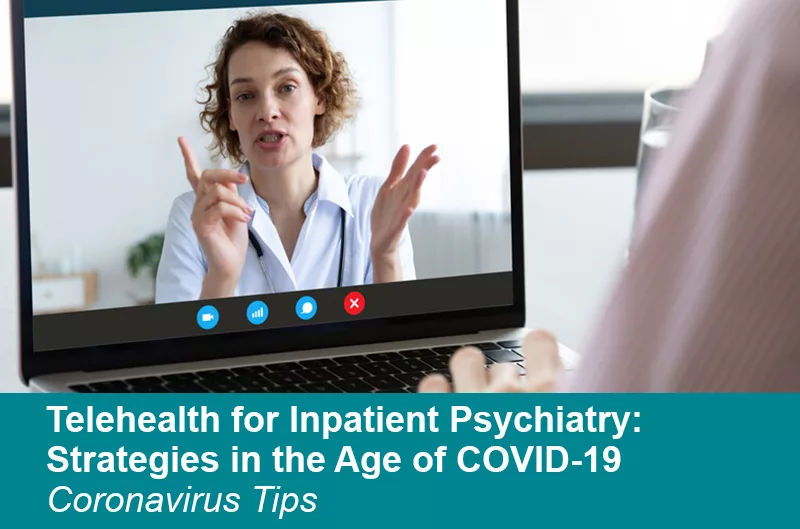As I mentioned in my last post on social distancing strategies, these techniques are very difficult on our typically crowded and small inpatient units. The ultimate social distancing technique is to avoid setting foot in the unit, which is where telehealth comes in.
Remote treatment has rapidly become the standard for psychiatric outpatient care during the pandemic, but inpatient units present more challenges. At one of my psych units at Melrose Wakefield Hospital, we have begun introducing telemedicine treatment, and in this post I’ll discuss the major tasks that we (and many other hospitals) must accomplish.
1. Get permission from your state mental health authority.
In my state, Massachusetts, this authority is the Department of Mental Health, and they typically permit telemedicine for any hospital that requests it. The main stipulation is that you are not planning to use telemed to evaluate patients on temporary holds (“section 12” in Massachusetts) or to order restraints. As long as you are planning to use the technology for standard evaluation and treatment, chances are very good you’ll get permission.
2. Choose your videoconferencing platform.
This choice used to be hard, but now it’s easy. On March 17, the Department of Health and Human Services announced that they will consider a much broader range of “everyday” technologies to be HIPAA compliant. These include Skype, Facetime, Google Hangouts and others. On our inpatient unit, we have chosen to use Skype. However, if you’re worried that the government will revert back to the bad old days of more stringent HIPAA standards (which, let’s face it, they probably will), you might want to choose one of the pre-COVID era HIPAA compliant platforms. There are many that are not too expensive. These include Skype for business, Zoom for healthcare, Doxy.me (actually free), and others.
3. Decide which devices you will use.
Most facilities will use a laptop for video interviews. But there is no reason why you can’t use an I-pad, or other smart phone/device. In fact, if your unit allows patients to use their own smart phones during the admission, remote providers could simply call them directly in their rooms using FaceTime or something similar.
4. Come up with a process for implementation.
Where will the video interviews take place? Which staff members are going to be in charge of setting up the laptop or other device? Who (if anybody) is going to be sitting with the patient while you interview them? When are interview is going to be scheduled? What you do when patient’s refuse to come out of the room, or refuse to be interviewed by video at all? How do you bill for telehealth visits? Such devilish details go on and on. You won’t necessarily have answers to all these questions before you start implementing telemedicine, but try to think ahead as much as possible.
In future posts I’ll go into some of these more granular implementation issues so that you won’t have to reinvent the wheel. Till then, start planning your telehealth program!
Remote treatment has rapidly become the standard for psychiatric outpatient care during the pandemic, but inpatient units present more challenges. At one of my psych units at Melrose Wakefield Hospital, we have begun introducing telemedicine treatment, and in this post I’ll discuss the major tasks that we (and many other hospitals) must accomplish.
1. Get permission from your state mental health authority.
In my state, Massachusetts, this authority is the Department of Mental Health, and they typically permit telemedicine for any hospital that requests it. The main stipulation is that you are not planning to use telemed to evaluate patients on temporary holds (“section 12” in Massachusetts) or to order restraints. As long as you are planning to use the technology for standard evaluation and treatment, chances are very good you’ll get permission.
2. Choose your videoconferencing platform.
This choice used to be hard, but now it’s easy. On March 17, the Department of Health and Human Services announced that they will consider a much broader range of “everyday” technologies to be HIPAA compliant. These include Skype, Facetime, Google Hangouts and others. On our inpatient unit, we have chosen to use Skype. However, if you’re worried that the government will revert back to the bad old days of more stringent HIPAA standards (which, let’s face it, they probably will), you might want to choose one of the pre-COVID era HIPAA compliant platforms. There are many that are not too expensive. These include Skype for business, Zoom for healthcare, Doxy.me (actually free), and others.
3. Decide which devices you will use.
Most facilities will use a laptop for video interviews. But there is no reason why you can’t use an I-pad, or other smart phone/device. In fact, if your unit allows patients to use their own smart phones during the admission, remote providers could simply call them directly in their rooms using FaceTime or something similar.
4. Come up with a process for implementation.
Where will the video interviews take place? Which staff members are going to be in charge of setting up the laptop or other device? Who (if anybody) is going to be sitting with the patient while you interview them? When are interview is going to be scheduled? What you do when patient’s refuse to come out of the room, or refuse to be interviewed by video at all? How do you bill for telehealth visits? Such devilish details go on and on. You won’t necessarily have answers to all these questions before you start implementing telemedicine, but try to think ahead as much as possible.
In future posts I’ll go into some of these more granular implementation issues so that you won’t have to reinvent the wheel. Till then, start planning your telehealth program!


_-The-Breakthrough-Antipsychotic-That-Could-Change-Everything.webp?t=1729528747)



